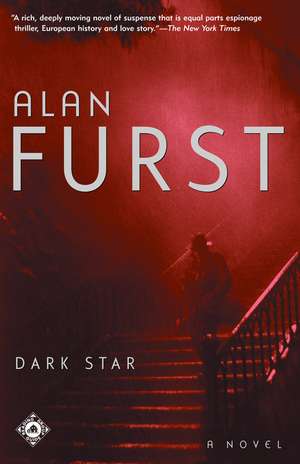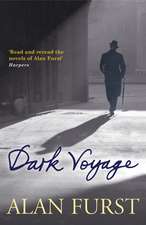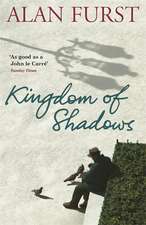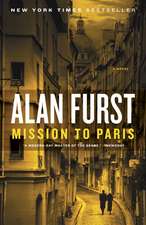Dark Star
Autor Alan Fursten Limba Engleză Paperback – 30 iun 2002
| Toate formatele și edițiile | Preț | Express |
|---|---|---|
| Paperback (2) | 49.44 lei 3-5 săpt. | +25.95 lei 5-11 zile |
| Orion Publishing Group – 30 apr 2009 | 49.44 lei 3-5 săpt. | +25.95 lei 5-11 zile |
| Random House Trade – 30 iun 2002 | 127.00 lei 3-5 săpt. |
Preț: 127.00 lei
Nou
Puncte Express: 191
Preț estimativ în valută:
24.31€ • 26.41$ • 20.43£
24.31€ • 26.41$ • 20.43£
Carte disponibilă
Livrare economică 31 martie-14 aprilie
Preluare comenzi: 021 569.72.76
Specificații
ISBN-13: 9780375759994
ISBN-10: 0375759999
Pagini: 480
Ilustrații: ENDPAPER MAPS
Dimensiuni: 131 x 204 x 25 mm
Greutate: 0.35 kg
Ediția:Rh Trade Paperb.
Editura: Random House Trade
ISBN-10: 0375759999
Pagini: 480
Ilustrații: ENDPAPER MAPS
Dimensiuni: 131 x 204 x 25 mm
Greutate: 0.35 kg
Ediția:Rh Trade Paperb.
Editura: Random House Trade
Notă biografică
Often compared to Graham Greene and Eric Ambler, Alan Furst is a master of the spy thriller and one of the great war novelists of our time. He is the author of Night Soldiers, Dark Star, The Polish Officer, and The World at Night. He lives in Sag Harbor, New York.
From the Hardcover edition.
From the Hardcover edition.
Extras
SILENCE IN PRAGUE
In the late autumn of 1937, in the steady beat of North Sea rain that comes with dawn in that season, the tramp freighter Nicaea stood at anchor off the Belgian city of Ostend. In the distance, a berthing tug made slow progress through the harbor swell, the rhythm of its engine distinct over the water, its amber running lights twin blurs in the darkness.
The Nicaea, 6,320 gross tonnes, of Maltese registry, had spent her first thirty years as a coastal steamer in the eastern Mediterranean, hauling every imaginable cargo from Latakia to Famagusta, back to Iskenderun, down to Beirut, north to Smyrna, then south to Sidon and Jaffa—thirty years of blistering summers and drizzling winters, trading and smuggling in equal proportion, occasionally enriching, more typically ruining, a succession of owner syndicates as she herself was slowly ruined by salt, rust, and a long line of engineers whose enthusiasm far exceeded their skill. Now, in her final years, she was chartered to Exportkhleb, the Soviet Union’s grain-trading bureau, and she creaked and groaned sorrowfully to lie at anchor in such cold, northern seas.
Riding low in the water, she bore her cargo gracelessly—principally Anatolian wheat bound for the Black Sea port of Odessa, a city that had not seen imported grains for more than a century. She carried, as well, several small consignments: flaxseed loaded in Istanbul, dried figs from Limassol, a steel drum of Ammonal—a mining explosive made of TNT and powdered aluminum—en route to a sabotage cell in Hamburg, a metal trunk of engineering blueprints for an Italian submarine torpedo, deftly copied at a naval research station in Brindisi, and two passengers: a senior Comintern official using a Dutch passport with the alias Van Doorn, and a foreign correspondent of the newspaper Pravda traveling under his true name, André Szara.
Szara, hands thrust deep in pockets, hair blown about by the offshore gale, stood in the shelter of a passageway and silently cursed the Belgian tug captain who, from the methodical chug of the engine, was taking his own sweet time attending to the Nicaea. Szara knew harbormen in this part of the world; stolid, reflective pipe smokers who were never far from the coffeepot and the evening paper. Unshakable in crisis, they spent the rest of their days making the world wait on their pleasure. Szara shifted his weight with the roll of the ship, turned his back to the wind, and lit a cigarette.
He had boarded the freighter nineteen days earlier, in Piraeus, having been assigned a story on the struggle of the Belgian dockworkers. That was one assignment; there was another. Killing time in a dockside tavern as the Nicaea was eased into moorage, he had been approached by the World’s Plainest Man. Where, he wondered, did they find them? Russia marked people: deformed most, made some exquisite, at the very least burned itself deep into the eyes. But not this one. His mother was water, his father a wall. “A small favor,” said the world’s plainest man. “You’ll have a fellow passenger, he is traveling on Comintern business. Perhaps you will find out where he is stopping in Ostend.”
“If I can,” Szara had said. The word if could not really be used between them, but Szara pretended it could be and the NKVD operative—or GRU or whatever he was—graciously conceded his right to suggest he had a choice in the matter. Szara, after all, was an important correspondent.
“Yes. If you can,” he’d said. Then added, “Leave us a little note at the desk of your hotel. To Monsieur Brun.”
Szara spelled it, to make sure he’d got it right. Defiance was over for the day.
“Just so,” said the man.
There was ample time to do the small favor; the Nicaea had been at sea for nineteen days, an eternity of icy, seawater showers, salt cod for dinner, and the smell of coal fumes from the freighter’s rusting stack as she butted through the October seas. Squinting through the darkness at the lights of the wallowing tug, Szara ached for something sweet, sugar after salt, a cream cake, rain in a pine forest, a woman’s perfume. He had, he thought, been too long at sea. An ironist, he heard the theatrical echo of the phrase and grinned privately. La mélancolie des paquebots—that said it better. He’d come across the phrase in Flaubert and it had stayed with him; it was all in those four words, the narrow cabin with a light bulb swaying on a cord, the seaweed reek of harbors, slanting rains, a column of black smoke from a funnel on the horizon.
The ship’s bell sounded once. Four-thirty. The tug’s amber lights grew brighter.
The Comintern man known as Van Doorn stepped from his cabin carrying a leather valise and joined Szara at the railing. He was swaddled in clothing like a child dressed for a winter day, woolen muffler crossed precisely at his throat, cap set low on his head, overcoat buttoned to the very top. “One hour, eh? And we’ll be down the gangplank. What is your view, André Aronovich?” Van Doorn was, as always, wryly deferential toward “the famous journalist Szara.”
“If the port officer makes no difficulties, I would agree,” Szara said.
“That will not happen. He is nasch.” The word meant ours, we own him, and the tone suggested Szara’s great fortune in having such iron-fisted types as Van Doorn to watch out for him “in the real world.”
“Well, then . . .” Szara said, acknowledging superior strength.
It happened that Szara knew who Van Doorn was; one of his friends in the Foreign Department of the NKVD had once pointed him out, with a sneer, at a party in Moscow. Szara’s NKVD friends were, like himself, Russified Polish Jews or Latvians, Ukrainians, Germans, all sorts, and typically intellectuals. They constituted his khvost—the word fell somewhere between clique and gang. Van Doorn, in fact Grigory Khelidze, was from a different crowd: Georgians, Armenians, Russified Greeks and Turks, a khvost with roots in the southeast corner of the empire led by Beria, Dekanozov, and Alexei Agayan. It was a smaller group than the Poles and Ukrainians but easily its equal in power. Stalin came from down there; they knew what he liked and how he thought.
From the tugboat’s silhouette, a high shape against the rain-softened glow of the city, a blinkered signal light began to operate. This was progress. Khelidze rubbed his hands to warm them up. “Not long now,” he said merrily. He gave Szara a lecher’s grin; in no time at all he’d be with his “perfect dumpling.”
Thank heaven for the dumpling, Szara thought. Without her he might never have managed the small favor. Khelidze wasn’t much to look at, a fattish man in his forties with pale hair worn well brushed and pomaded. His hands were small and chubby, endlessly fussing with a pair of silver-rimmed spectacles of which he was very proud. But he fancied himself a ladies’ man. “I envy you, André Aronovich,” he’d said one night when they were alone in the ship’s wardroom after dinner. “You move in exalted circles. The way it is with my job, well, the best I can hope for is the frau of some German shop steward, a big Inga with red hands, and then, likely as not, all a man gets is an extra potato and a stolen cuddle in the kitchen. Ah, but a man in your position—for you it’s professors’ daughters and lawyers’ wives; those hot, skinny bitches that can’t leave a journalist alone. Isn’t it so?”
Szara had brought vodka to the feast, also brandy. The vast, green ocean rolled beneath them, the Nicaea’s engines coughed and grumbled. Khelidze rested his elbows on the faded oilcloth and leaned forward in expectation, a man who wanted to hear every detail.
Szara obliged. His talent, set alight by alcohol, burned and flamed. A certain lady in, ah, Budapest. Gold earrings like a Gypsy—but no Gypsy, an aristocrat who affected British tweeds and wore a silk scarf, the color of a cloud, knotted at her throat. Hair dark red, like autumn, Magyar cheekbones, long, delicate fingers. Szara, a good storyteller, took his time. He cast about for a name, came up with Magda, thought it commonplace, but could do no better. Magda, then. The husband was a lout, ignorant, nas kulturny—a man of no culture who exported wool. So Szara had the wife. Where. In the stables? On straw? No, in the apartment, a cinq-à-sept affaire by lamplight. The husband was . . . hunting wild boar. Szara watched the level in the brandy bottle on the table. As it descended, so did the pants. And there, the most delicate little triangle, also dark red, like autumn. And fine blue veins beneath the milky skin. The green silk divan was ruined. Khelidze’s ears were scarlet. Later it came to Szara that he’d been describing his private musings on a particular secretary he sometimes encountered at the Yugoslav Ministry of Posts and Telegraph.
Khelidze was drunk. He polished his glasses with a handkerchief, his eyes watery and vague. Yes well, he said, one sometimes imagined. For himself, well it was all a matter of taste in this life wasn’t it. He had, in all confidence, “a perfect dumpling” in Ostend, resident at the Hotel Groenendaal in the street of the same name. “A fat little thing. They dress her up like a child, with a bow and a party dress of white satin. My God, André Aronovich, how we carry on! Such a grand little actress she is, pouting, sulking, tossing her curls about, whining for cookies and milk. But she can’t have them. No, definitely not! Because, well, there’s something she must do first. Oh no, she wails. Oh yes.” Khelidze sat back in his chair, put his glasses on, and sighed. “A marvel,” he said. “She’ll suck ten years off a man’s life.”
By the time they went singing off to bed, holding each other upright in the passageway that rolled with the motion of the ship, the dark surface of the sea was turning gray with dawn.
Szara’s hotel in Ostend was all flowers: on the wallpaper, heavy cabbage roses on a somber field; on the bedspread, a jungle of vines and geraniums; and in the park below his window, frostbitten asters, dusty purple and faded pink. And the place was called the Hotel Blommen. Ignore this stern, northern, Flemish light, here we have flowers. Szara stood at the window and listened to the foghorns from the harbor and the rattle of dead leaves as the wind swept them through the deserted park. He folded the note and creased it between thumb and index finger: “M. Van Doorn will be visiting the Hotel Groenendaal.” He put it in an envelope, licked and sealed it, and wrote “M. Brun” on the front. He didn’t know what it meant, why a journalist was asked to report on a Comintern operative. But there was a reason, a single reason that lately explained anything you wanted explained: the purge had shuddered to a halt in ’36, now another had begun. The first had taken politicians, Stalin’s opposition, and more than a few journalists. This one, it was said, had gone to work on the intelligence services themselves. Szara, beginning in 1934, had learned to live with it: he was careful what he wrote, what he said, who he saw. Not yet what he thought—not yet, he told himself now and then, as though it needed to be said. He took the note down to the reception desk and handed it to the old man behind the counter.
The knock on the door was discreet, two taps with a knuckle. Szara had fallen asleep, still wearing shirt and trousers, on top of the bedspread. He sat up and pulled the damp shirt away from his back. It was a gray dawn outside the window, fog hanging in the tree branches. He looked at his watch—a little after six. The polite knock came a second time and Szara felt his heart accelerate. A knock at the door meant too much, nobody did that in Moscow anymore, they phoned first. “Yes, a moment,” he said. Somewhere within, a small, urgent voice: out the window. He took a breath, staggered to his feet, and opened the door. It was the old man from the hotel desk, holding a coffee and a newspaper. Had he left a call to be woken up? No.
“Good morning, good morning,” said the old man tartly. It never really was, but one had to pretend. “Your friend was kind enough to leave you the newspaper,” he added, putting it at the foot of the bed.
Szara fumbled for change and handed over a few coins. Drachmas, he thought. He’d bought Belgian francs in Athens; where were they? But the old man seemed happy enough, thanked him and left. The coffee was cooler than he would have liked, the boiled milk a little sour, but he was grateful for it. The front page of the newspaper was devoted to anti-Jewish riots that had broken out in Danzig, with a photo of shouting, black-shirted Nazis. In Spain the Republican government, under pressure from Franco’s columns, had fled from Valencia to Barcelona. On page 6, the misfortunes of Ostend’s soccer team. Printed down the margin in pen, in a fine Cyrillic hand, were detailed instructions for a noon meeting. The “small favor” had started to grow.
Szara walked down the hall, locked the door of the bathroom, and started to wash. The instructions in the newspaper frightened him; he was afraid of being forced into a car and taken away. The purge sometimes worked like that—the security apparat worked quietly when it took public figures. Senior NKVD officers were called to meetings in small towns just outside Moscow, then arrested as they got off the train, a tactic that kept friends and family from trying to intervene. A foreign country, he reasoned, would be even more convenient. Should he run? Was now the time? There was a part of him that thought so. Go to the British consulate, it said. Fly for your life. Call the friends in Moscow who protect you. Buy a gun. Meanwhile, he shaved.
Then he sat in the park, where a nursemaid with a baby carriage flirted with him. Go with her, he told himself, hide in her bed. She will do anything you want. Perhaps it was true. He very well knew, at the age of forty, somewhat past illusion, what she saw. The longish black hair he combed back with his fingers, the tight line of the jaw, a concentration of personality in the eyes. These were hooded, knowing, of a gray-green sea color that women had more than once called “strange,” and often read as both expectant and sorrowful, like dogs eyes. His features were delicate, skin colorless, made to seem pallid by a permanent beard shadow. It was, taken altogether, a sad, attentive presence, anxious for happiness, certain of disappointment. He dressed the role of worldly intellectual, favoring soft clothing: thick gray cotton shirts, monochromatic ties in the somber tones of basic colors. He was, in the world’s mirror, a man you could take seriously, at least for a time. Then, later, there would be affection or intense dislike, a strong reaction whichever way it went.
The nursemaid, in a starched cap, plain, hand mindlessly rocking the carriage where some other woman’s baby slept, had no doubts at all. He need only rescue her, from boredom, servitude, chapped hands, and she would do whatever was necessary. Below a broad forehead her eyes were frank. Don’t be frightened. I can fix anything.
Just before ten-thirty he stood, pulled his raincoat tightly about him, and walked away. Glancing back, he easily read her expression: Then no? Stupid man.
A series of tram lines took him to a neighborhood of worker tenements, the narrow streets smelled like fish, urine, fried onions. The November day was cool in the shadow of the buildings. Was he fol- lowed? He thought not. They had something better, a kind of invisi- ble cable, the method the psychologist Pavlov used with laboratory animals. It was called—he had to look for the word—conditioning. His last day on earth, yet he did what he was told. His mind stood off and watched the scene: a man of intellect, independence, delivering himself to the apparat. Pitiful. Contemptible. Szara glanced at his watch. He didn’t want to be late.
At a small market he stopped and bought fruit, then paid a few sou extra for a paper bag. The market woman wore a shawl over her head; her glance was suspicious. What was he, a foreigner, doing in this part of the city? Szara walked another block, made sure nobody was watching, and left most of the fruit in an alley. He watched the street behind him in a shop window where wooden soldiers were for sale. Then he moved off again, entering a small square lined by plane trees cut back to rounded pollard shapes for the coming winter. A driver slept in a parked taxi, a man in bleu de travail sat on a bench and stared at his feet, the war memorial fountain was dry: the square at the end of the world. A small brasserie, Le Terminus, had no patrons on its glassed-in terrasse.
Szara, more and more now the critic of his own abduction, was struck by the normalcy of the scene. What a placid, ordinary place they’d chosen. Perhaps they liked the name of the brasserie, Le Terminus—the terminal, the end of the line. Was the choice ironic? Were they that clever? Perhaps Pavlov was not, after all, the day’s guiding spirit; perhaps that honor belonged to Chekhov, or Gorky. He searched for a terminal, for tram tracks, a railroad station, but there was nothing he could see.
Suddenly he was in a hurry. Whatever this was, he wanted it over and done with.
The interior of the brasserie was enormous and silent. Szara stood in the foyer as the door behind him bumped back and forth until it came to rest. Behind the zinc bar a man in a white shirt with cuffs turned back was aimlessly stirring a coffee, a few patrons sat quietly with a glass of beer, one or two were eating. Szara felt himself swept by intuition, a sense of loss, a conviction that this still life of a brasserie in Ostend was a frozen image of what had been and would now vanish forever: amber walls, marble tables, a wooden fan slowly turning on the smoke-darkened ceiling, a florid-faced man with a handlebar mustache who rattled his newspaper into place, the scrape of a chair on the tile floor, the cry of a seagull from the square, the sound of a ship’s horn from the harbor.
There was an old weather glass on one wall, beneath it sat a woman in a brown, belted raincoat with buttoned epaulets on the shoulders. She glanced at him, then went back to eating, a plate of eels and pommes frites; Szara could smell the horse fat the Belgians used for frying. A red wool scarf was looped over the top of an adjacent chair. The glass and the scarf were the recognition signals described in the margin of the newspaper.
In the late autumn of 1937, in the steady beat of North Sea rain that comes with dawn in that season, the tramp freighter Nicaea stood at anchor off the Belgian city of Ostend. In the distance, a berthing tug made slow progress through the harbor swell, the rhythm of its engine distinct over the water, its amber running lights twin blurs in the darkness.
The Nicaea, 6,320 gross tonnes, of Maltese registry, had spent her first thirty years as a coastal steamer in the eastern Mediterranean, hauling every imaginable cargo from Latakia to Famagusta, back to Iskenderun, down to Beirut, north to Smyrna, then south to Sidon and Jaffa—thirty years of blistering summers and drizzling winters, trading and smuggling in equal proportion, occasionally enriching, more typically ruining, a succession of owner syndicates as she herself was slowly ruined by salt, rust, and a long line of engineers whose enthusiasm far exceeded their skill. Now, in her final years, she was chartered to Exportkhleb, the Soviet Union’s grain-trading bureau, and she creaked and groaned sorrowfully to lie at anchor in such cold, northern seas.
Riding low in the water, she bore her cargo gracelessly—principally Anatolian wheat bound for the Black Sea port of Odessa, a city that had not seen imported grains for more than a century. She carried, as well, several small consignments: flaxseed loaded in Istanbul, dried figs from Limassol, a steel drum of Ammonal—a mining explosive made of TNT and powdered aluminum—en route to a sabotage cell in Hamburg, a metal trunk of engineering blueprints for an Italian submarine torpedo, deftly copied at a naval research station in Brindisi, and two passengers: a senior Comintern official using a Dutch passport with the alias Van Doorn, and a foreign correspondent of the newspaper Pravda traveling under his true name, André Szara.
Szara, hands thrust deep in pockets, hair blown about by the offshore gale, stood in the shelter of a passageway and silently cursed the Belgian tug captain who, from the methodical chug of the engine, was taking his own sweet time attending to the Nicaea. Szara knew harbormen in this part of the world; stolid, reflective pipe smokers who were never far from the coffeepot and the evening paper. Unshakable in crisis, they spent the rest of their days making the world wait on their pleasure. Szara shifted his weight with the roll of the ship, turned his back to the wind, and lit a cigarette.
He had boarded the freighter nineteen days earlier, in Piraeus, having been assigned a story on the struggle of the Belgian dockworkers. That was one assignment; there was another. Killing time in a dockside tavern as the Nicaea was eased into moorage, he had been approached by the World’s Plainest Man. Where, he wondered, did they find them? Russia marked people: deformed most, made some exquisite, at the very least burned itself deep into the eyes. But not this one. His mother was water, his father a wall. “A small favor,” said the world’s plainest man. “You’ll have a fellow passenger, he is traveling on Comintern business. Perhaps you will find out where he is stopping in Ostend.”
“If I can,” Szara had said. The word if could not really be used between them, but Szara pretended it could be and the NKVD operative—or GRU or whatever he was—graciously conceded his right to suggest he had a choice in the matter. Szara, after all, was an important correspondent.
“Yes. If you can,” he’d said. Then added, “Leave us a little note at the desk of your hotel. To Monsieur Brun.”
Szara spelled it, to make sure he’d got it right. Defiance was over for the day.
“Just so,” said the man.
There was ample time to do the small favor; the Nicaea had been at sea for nineteen days, an eternity of icy, seawater showers, salt cod for dinner, and the smell of coal fumes from the freighter’s rusting stack as she butted through the October seas. Squinting through the darkness at the lights of the wallowing tug, Szara ached for something sweet, sugar after salt, a cream cake, rain in a pine forest, a woman’s perfume. He had, he thought, been too long at sea. An ironist, he heard the theatrical echo of the phrase and grinned privately. La mélancolie des paquebots—that said it better. He’d come across the phrase in Flaubert and it had stayed with him; it was all in those four words, the narrow cabin with a light bulb swaying on a cord, the seaweed reek of harbors, slanting rains, a column of black smoke from a funnel on the horizon.
The ship’s bell sounded once. Four-thirty. The tug’s amber lights grew brighter.
The Comintern man known as Van Doorn stepped from his cabin carrying a leather valise and joined Szara at the railing. He was swaddled in clothing like a child dressed for a winter day, woolen muffler crossed precisely at his throat, cap set low on his head, overcoat buttoned to the very top. “One hour, eh? And we’ll be down the gangplank. What is your view, André Aronovich?” Van Doorn was, as always, wryly deferential toward “the famous journalist Szara.”
“If the port officer makes no difficulties, I would agree,” Szara said.
“That will not happen. He is nasch.” The word meant ours, we own him, and the tone suggested Szara’s great fortune in having such iron-fisted types as Van Doorn to watch out for him “in the real world.”
“Well, then . . .” Szara said, acknowledging superior strength.
It happened that Szara knew who Van Doorn was; one of his friends in the Foreign Department of the NKVD had once pointed him out, with a sneer, at a party in Moscow. Szara’s NKVD friends were, like himself, Russified Polish Jews or Latvians, Ukrainians, Germans, all sorts, and typically intellectuals. They constituted his khvost—the word fell somewhere between clique and gang. Van Doorn, in fact Grigory Khelidze, was from a different crowd: Georgians, Armenians, Russified Greeks and Turks, a khvost with roots in the southeast corner of the empire led by Beria, Dekanozov, and Alexei Agayan. It was a smaller group than the Poles and Ukrainians but easily its equal in power. Stalin came from down there; they knew what he liked and how he thought.
From the tugboat’s silhouette, a high shape against the rain-softened glow of the city, a blinkered signal light began to operate. This was progress. Khelidze rubbed his hands to warm them up. “Not long now,” he said merrily. He gave Szara a lecher’s grin; in no time at all he’d be with his “perfect dumpling.”
Thank heaven for the dumpling, Szara thought. Without her he might never have managed the small favor. Khelidze wasn’t much to look at, a fattish man in his forties with pale hair worn well brushed and pomaded. His hands were small and chubby, endlessly fussing with a pair of silver-rimmed spectacles of which he was very proud. But he fancied himself a ladies’ man. “I envy you, André Aronovich,” he’d said one night when they were alone in the ship’s wardroom after dinner. “You move in exalted circles. The way it is with my job, well, the best I can hope for is the frau of some German shop steward, a big Inga with red hands, and then, likely as not, all a man gets is an extra potato and a stolen cuddle in the kitchen. Ah, but a man in your position—for you it’s professors’ daughters and lawyers’ wives; those hot, skinny bitches that can’t leave a journalist alone. Isn’t it so?”
Szara had brought vodka to the feast, also brandy. The vast, green ocean rolled beneath them, the Nicaea’s engines coughed and grumbled. Khelidze rested his elbows on the faded oilcloth and leaned forward in expectation, a man who wanted to hear every detail.
Szara obliged. His talent, set alight by alcohol, burned and flamed. A certain lady in, ah, Budapest. Gold earrings like a Gypsy—but no Gypsy, an aristocrat who affected British tweeds and wore a silk scarf, the color of a cloud, knotted at her throat. Hair dark red, like autumn, Magyar cheekbones, long, delicate fingers. Szara, a good storyteller, took his time. He cast about for a name, came up with Magda, thought it commonplace, but could do no better. Magda, then. The husband was a lout, ignorant, nas kulturny—a man of no culture who exported wool. So Szara had the wife. Where. In the stables? On straw? No, in the apartment, a cinq-à-sept affaire by lamplight. The husband was . . . hunting wild boar. Szara watched the level in the brandy bottle on the table. As it descended, so did the pants. And there, the most delicate little triangle, also dark red, like autumn. And fine blue veins beneath the milky skin. The green silk divan was ruined. Khelidze’s ears were scarlet. Later it came to Szara that he’d been describing his private musings on a particular secretary he sometimes encountered at the Yugoslav Ministry of Posts and Telegraph.
Khelidze was drunk. He polished his glasses with a handkerchief, his eyes watery and vague. Yes well, he said, one sometimes imagined. For himself, well it was all a matter of taste in this life wasn’t it. He had, in all confidence, “a perfect dumpling” in Ostend, resident at the Hotel Groenendaal in the street of the same name. “A fat little thing. They dress her up like a child, with a bow and a party dress of white satin. My God, André Aronovich, how we carry on! Such a grand little actress she is, pouting, sulking, tossing her curls about, whining for cookies and milk. But she can’t have them. No, definitely not! Because, well, there’s something she must do first. Oh no, she wails. Oh yes.” Khelidze sat back in his chair, put his glasses on, and sighed. “A marvel,” he said. “She’ll suck ten years off a man’s life.”
By the time they went singing off to bed, holding each other upright in the passageway that rolled with the motion of the ship, the dark surface of the sea was turning gray with dawn.
Szara’s hotel in Ostend was all flowers: on the wallpaper, heavy cabbage roses on a somber field; on the bedspread, a jungle of vines and geraniums; and in the park below his window, frostbitten asters, dusty purple and faded pink. And the place was called the Hotel Blommen. Ignore this stern, northern, Flemish light, here we have flowers. Szara stood at the window and listened to the foghorns from the harbor and the rattle of dead leaves as the wind swept them through the deserted park. He folded the note and creased it between thumb and index finger: “M. Van Doorn will be visiting the Hotel Groenendaal.” He put it in an envelope, licked and sealed it, and wrote “M. Brun” on the front. He didn’t know what it meant, why a journalist was asked to report on a Comintern operative. But there was a reason, a single reason that lately explained anything you wanted explained: the purge had shuddered to a halt in ’36, now another had begun. The first had taken politicians, Stalin’s opposition, and more than a few journalists. This one, it was said, had gone to work on the intelligence services themselves. Szara, beginning in 1934, had learned to live with it: he was careful what he wrote, what he said, who he saw. Not yet what he thought—not yet, he told himself now and then, as though it needed to be said. He took the note down to the reception desk and handed it to the old man behind the counter.
The knock on the door was discreet, two taps with a knuckle. Szara had fallen asleep, still wearing shirt and trousers, on top of the bedspread. He sat up and pulled the damp shirt away from his back. It was a gray dawn outside the window, fog hanging in the tree branches. He looked at his watch—a little after six. The polite knock came a second time and Szara felt his heart accelerate. A knock at the door meant too much, nobody did that in Moscow anymore, they phoned first. “Yes, a moment,” he said. Somewhere within, a small, urgent voice: out the window. He took a breath, staggered to his feet, and opened the door. It was the old man from the hotel desk, holding a coffee and a newspaper. Had he left a call to be woken up? No.
“Good morning, good morning,” said the old man tartly. It never really was, but one had to pretend. “Your friend was kind enough to leave you the newspaper,” he added, putting it at the foot of the bed.
Szara fumbled for change and handed over a few coins. Drachmas, he thought. He’d bought Belgian francs in Athens; where were they? But the old man seemed happy enough, thanked him and left. The coffee was cooler than he would have liked, the boiled milk a little sour, but he was grateful for it. The front page of the newspaper was devoted to anti-Jewish riots that had broken out in Danzig, with a photo of shouting, black-shirted Nazis. In Spain the Republican government, under pressure from Franco’s columns, had fled from Valencia to Barcelona. On page 6, the misfortunes of Ostend’s soccer team. Printed down the margin in pen, in a fine Cyrillic hand, were detailed instructions for a noon meeting. The “small favor” had started to grow.
Szara walked down the hall, locked the door of the bathroom, and started to wash. The instructions in the newspaper frightened him; he was afraid of being forced into a car and taken away. The purge sometimes worked like that—the security apparat worked quietly when it took public figures. Senior NKVD officers were called to meetings in small towns just outside Moscow, then arrested as they got off the train, a tactic that kept friends and family from trying to intervene. A foreign country, he reasoned, would be even more convenient. Should he run? Was now the time? There was a part of him that thought so. Go to the British consulate, it said. Fly for your life. Call the friends in Moscow who protect you. Buy a gun. Meanwhile, he shaved.
Then he sat in the park, where a nursemaid with a baby carriage flirted with him. Go with her, he told himself, hide in her bed. She will do anything you want. Perhaps it was true. He very well knew, at the age of forty, somewhat past illusion, what she saw. The longish black hair he combed back with his fingers, the tight line of the jaw, a concentration of personality in the eyes. These were hooded, knowing, of a gray-green sea color that women had more than once called “strange,” and often read as both expectant and sorrowful, like dogs eyes. His features were delicate, skin colorless, made to seem pallid by a permanent beard shadow. It was, taken altogether, a sad, attentive presence, anxious for happiness, certain of disappointment. He dressed the role of worldly intellectual, favoring soft clothing: thick gray cotton shirts, monochromatic ties in the somber tones of basic colors. He was, in the world’s mirror, a man you could take seriously, at least for a time. Then, later, there would be affection or intense dislike, a strong reaction whichever way it went.
The nursemaid, in a starched cap, plain, hand mindlessly rocking the carriage where some other woman’s baby slept, had no doubts at all. He need only rescue her, from boredom, servitude, chapped hands, and she would do whatever was necessary. Below a broad forehead her eyes were frank. Don’t be frightened. I can fix anything.
Just before ten-thirty he stood, pulled his raincoat tightly about him, and walked away. Glancing back, he easily read her expression: Then no? Stupid man.
A series of tram lines took him to a neighborhood of worker tenements, the narrow streets smelled like fish, urine, fried onions. The November day was cool in the shadow of the buildings. Was he fol- lowed? He thought not. They had something better, a kind of invisi- ble cable, the method the psychologist Pavlov used with laboratory animals. It was called—he had to look for the word—conditioning. His last day on earth, yet he did what he was told. His mind stood off and watched the scene: a man of intellect, independence, delivering himself to the apparat. Pitiful. Contemptible. Szara glanced at his watch. He didn’t want to be late.
At a small market he stopped and bought fruit, then paid a few sou extra for a paper bag. The market woman wore a shawl over her head; her glance was suspicious. What was he, a foreigner, doing in this part of the city? Szara walked another block, made sure nobody was watching, and left most of the fruit in an alley. He watched the street behind him in a shop window where wooden soldiers were for sale. Then he moved off again, entering a small square lined by plane trees cut back to rounded pollard shapes for the coming winter. A driver slept in a parked taxi, a man in bleu de travail sat on a bench and stared at his feet, the war memorial fountain was dry: the square at the end of the world. A small brasserie, Le Terminus, had no patrons on its glassed-in terrasse.
Szara, more and more now the critic of his own abduction, was struck by the normalcy of the scene. What a placid, ordinary place they’d chosen. Perhaps they liked the name of the brasserie, Le Terminus—the terminal, the end of the line. Was the choice ironic? Were they that clever? Perhaps Pavlov was not, after all, the day’s guiding spirit; perhaps that honor belonged to Chekhov, or Gorky. He searched for a terminal, for tram tracks, a railroad station, but there was nothing he could see.
Suddenly he was in a hurry. Whatever this was, he wanted it over and done with.
The interior of the brasserie was enormous and silent. Szara stood in the foyer as the door behind him bumped back and forth until it came to rest. Behind the zinc bar a man in a white shirt with cuffs turned back was aimlessly stirring a coffee, a few patrons sat quietly with a glass of beer, one or two were eating. Szara felt himself swept by intuition, a sense of loss, a conviction that this still life of a brasserie in Ostend was a frozen image of what had been and would now vanish forever: amber walls, marble tables, a wooden fan slowly turning on the smoke-darkened ceiling, a florid-faced man with a handlebar mustache who rattled his newspaper into place, the scrape of a chair on the tile floor, the cry of a seagull from the square, the sound of a ship’s horn from the harbor.
There was an old weather glass on one wall, beneath it sat a woman in a brown, belted raincoat with buttoned epaulets on the shoulders. She glanced at him, then went back to eating, a plate of eels and pommes frites; Szara could smell the horse fat the Belgians used for frying. A red wool scarf was looped over the top of an adjacent chair. The glass and the scarf were the recognition signals described in the margin of the newspaper.
Recenzii
Praise for Alan Furst and Dark Star
“A rich, deeply moving novel of suspense that is equal parts espionage thriller, European history and love story.”
—The New York Times
“Compelling...An excellent novel of history, betrayal and, most important, survival...While the story offers enough twists and turns to satisfy the most ardent spy fan, author Alan Furst transcends genre. This is a novel with heart.”
—San Francisco Chronicle
“This is a rich book, to be savored...for it is a work of an accomplished writer without obtrusively saying so on every other page. Furst has the instincts of the historian—he likes to get his sequences right, he tells a story straight, and he believes that setting matters—and the gifts of the storyteller.”
—The Boston Globe
“The time-frame of the late 1930s on the Continent was once the special property of Eric Ambler and Graham Greene; Furst has ventured into their fictional territory and brought out a story that is equally original and engaging.”
–Herbert Mitgang, The New York Times
“Dark Star is as fine an evocation of prewar Europe as anything I’ve ever read. An extremely well written and literate novel that practically creates a new genre: historical espionage.”
–Nelson DeMille, author of The Gold Coast
“Outclasses any spy novel I have ever read.”
–Richard Condon, author of The Manchurian Candidate
“Captures the murky allegiances and moral ambiguity of Europe on the brink of war. . . . Nothing can be like watching Casablanca for the first time. But Furst comes closer than anyone has in years.”
–Walter Shapiro, Time
“[Dark Star] explores the ambiguous moral ground familiar to readers of Graham Greene, Robert Stone, and le Carré. . . . Terrific stuff–poignant, moving, provocative.”
–Adam Woog, The Seattle Times
“Gripping . . . [Furst’s] details of the period . . . give the book a forceful–and sometimes terrifying–reality.”
–New York Newsday
“A page-churner of the best sort . . . Brilliant detail and sure sweep . . . Here is a thriller more deeply satisfying than much of the nonthrilling ‘serious fiction’ around today.”
–Los Angeles Times Book Review
“One of the best spy novels I’ve read in years. . . . The novel is impeccably researched. It’s as much historical fiction as it is spy fiction, and the atmosphere of danger and doom it creates by means of deftly employed historical details is matched only by the vividness of its mostly fictional characters. Dark Star doesn’t merely evoke the period. Because of its engaging plot and appealing hero, it makes you live there, suffer there, and hope.”
–Alan Cheuse, All Things Considered
“Kafka, Dostoyevsky, and le Carré sit up all night and talk to each other and this is what you get. It is absolutely wonderful.”
–Kirkus Reviews
“Intelligent, provocative, and gripping . . . Beautifully and compellingly told.”
–Publishers Weekly
“A rich, deeply moving novel of suspense that is equal parts espionage thriller, European history and love story.”
—The New York Times
“Compelling...An excellent novel of history, betrayal and, most important, survival...While the story offers enough twists and turns to satisfy the most ardent spy fan, author Alan Furst transcends genre. This is a novel with heart.”
—San Francisco Chronicle
“This is a rich book, to be savored...for it is a work of an accomplished writer without obtrusively saying so on every other page. Furst has the instincts of the historian—he likes to get his sequences right, he tells a story straight, and he believes that setting matters—and the gifts of the storyteller.”
—The Boston Globe
“The time-frame of the late 1930s on the Continent was once the special property of Eric Ambler and Graham Greene; Furst has ventured into their fictional territory and brought out a story that is equally original and engaging.”
–Herbert Mitgang, The New York Times
“Dark Star is as fine an evocation of prewar Europe as anything I’ve ever read. An extremely well written and literate novel that practically creates a new genre: historical espionage.”
–Nelson DeMille, author of The Gold Coast
“Outclasses any spy novel I have ever read.”
–Richard Condon, author of The Manchurian Candidate
“Captures the murky allegiances and moral ambiguity of Europe on the brink of war. . . . Nothing can be like watching Casablanca for the first time. But Furst comes closer than anyone has in years.”
–Walter Shapiro, Time
“[Dark Star] explores the ambiguous moral ground familiar to readers of Graham Greene, Robert Stone, and le Carré. . . . Terrific stuff–poignant, moving, provocative.”
–Adam Woog, The Seattle Times
“Gripping . . . [Furst’s] details of the period . . . give the book a forceful–and sometimes terrifying–reality.”
–New York Newsday
“A page-churner of the best sort . . . Brilliant detail and sure sweep . . . Here is a thriller more deeply satisfying than much of the nonthrilling ‘serious fiction’ around today.”
–Los Angeles Times Book Review
“One of the best spy novels I’ve read in years. . . . The novel is impeccably researched. It’s as much historical fiction as it is spy fiction, and the atmosphere of danger and doom it creates by means of deftly employed historical details is matched only by the vividness of its mostly fictional characters. Dark Star doesn’t merely evoke the period. Because of its engaging plot and appealing hero, it makes you live there, suffer there, and hope.”
–Alan Cheuse, All Things Considered
“Kafka, Dostoyevsky, and le Carré sit up all night and talk to each other and this is what you get. It is absolutely wonderful.”
–Kirkus Reviews
“Intelligent, provocative, and gripping . . . Beautifully and compellingly told.”
–Publishers Weekly
Descriere
The acclaimed author of Night Soldiers offers a dramatic and exciting spy thriller of Eastern Europe on the brink of World War II. In the back alleys and glittering salons of Europe, there is a thin line between survival and betrayal, as Soviet NKVD agents and the Nazi Gestapo confront each other in a brilliant duel of espionage. "Like watching Casablanca for the first time".--Time.

















